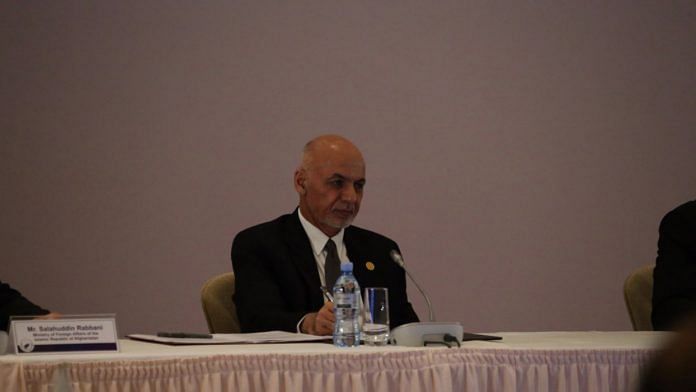A fragile government in a tough fight
The Afghanistan government is under a lot more pressure than usual: President Ashraf Ghani’s administration seems incapable of stopping attacks, which is only increasing criticism against his government. “He has labelled a recent suicide bombing, which killed 105 civilians, as his “9/11”,” writes The Economist. “Mr Ghani remains in a stand-off with the governor of the northern province of Balkh, Atta Muhammad Noor, who in December refused his order to resign. On February 25th Mr Noor blamed the “irresponsible” and “narcissistic” government for the attacks.”
“Mr Ghani’s theoretical training for his job is unparalleled. In 2008, the thin, combustible academic co-authored “Fixing Failed States”, a summary of his life’s research into the construction of institutions in war-torn countries.” Ghani, who used to be a World Bank official, has put some of his theories into action, and has stabilised the economy to an extent. He has even opened up new trade routes with neighbouring countries, and has recruited a “cadre of spreadsheet-friendly ministers”.
“The president is now trying to reduce bloodshed by offering to negotiate with the Taliban. This week he said he would be willing to recognise them as a political party and allow them to contest elections if they agreed to a ceasefire and worked within the constitution. The Taliban, who recently called for negotiations with America, have not yet responded to the offer.”
“Institutional reforms might help to defuse some of the political tensions. Under the power-sharing agreement, Mr Ghani and Mr Abdullah were supposed to have agreed on various constitutional amendments within two years, in part to formalise the position of chief executive (or prime minister). But it is not possible to amend the constitution without holding elections for local district councils, because the councils select delegates to a loya jirga, or constitutional convention. Local elections have, in turn, become mired in a dispute between the president and the legislature.”
“Another helpful step would be to allow candidates for the national parliament to run as representatives of a party, rather than as individuals. This could help Mr Ghani subdue the strongmen,” writes The Economist.
Palestinians no longer trust the American peace process
“Something strange is happening. Palestinians seem to have stopped caring about what President Trump says,” writes Daoud Kuttab in the Washington Post. “Palestinian leaders appear to be able to see through him and understand that his administration is incapable of making the “ultimate deal” and that it is not interested in a genuine negotiated peace between Israelis and Palestinians.”
What this means is that United States is not seen as an “honest broker” in the longstanding Israel-Palestine conflict. It also signals that the word of the American government is no longer being taken seriously. “Like the Israelis before them, American leaders today appear to be negotiating between themselves about the future of the Palestinian conflict,” writes Kuttab.
“Palestinians also have strong reasons to believe that Trump’s cheap blackmail tricks and threats are not serious. Nations large and small have called America’s bluff and gotten away with it.” Additionally, the scandals plaguing Trump and the Israeli prime minister, Benjamin Netanyahu, appear to be affecting the way they are perceived in the Middle East.
“Having finally decided to wean themselves from dependency on an American-only sponsorship of the peace process, Palestinians are realizing that there is nothing to be gained by engaging with either the current Israeli or American leaders. Palestinians continue to yearn for peace but they know that it is unlikely to come at the hands of today’s leaders in Washington and Tel Aviv.”
The fight for stronger democracy
“On July 1, we Mexicans will choose our president for the next six years. It will be no ordinary election,” writes Enrique Krauze in the New York Times. “During a period when democracy is being globally threatened, what may be in play is not only a change in government but also a change in the very nature of the liberal democracy that Mexico has built since the outset of the century.”
“Mexico is now a democracy but there is profound discontent with its results. Most Mexicans resent, and rightfully, the meager economic growth of the past few decades and the persistence of poverty and inequality. And four terrible problems complicate this situation: violence, insecurity, impunity and corruption. In the face of this desolating balance sheet, the natural reaction in any democracy is to punish the government in power,” he writes.
The current government in power is the Institutional Revolutionary Party, or the PRI, which Krauze thinks deserves to lose the election for being complicit in several acts of corruption.
“José Antonio Meade, candidate of the P.R.I., has suffered the consequences, falling well behind in the polls. If the present prospects do not change, the fight for the presidency will probably be resolved between Andrés Manuel López Obrador — candidate of the Morena Party, who is leading by 11 points in the polls — and Ricardo Anaya, candidate of the P.A.N. in alliance with the center-left Party of the Democratic Revolution and Movimiento Ciudadano.”
“It is to be hoped that the legitimate discontent of Mexicans and the urgent need for change does not lead to the demise of our fledgling but genuine democracy,” writes Krauze.



